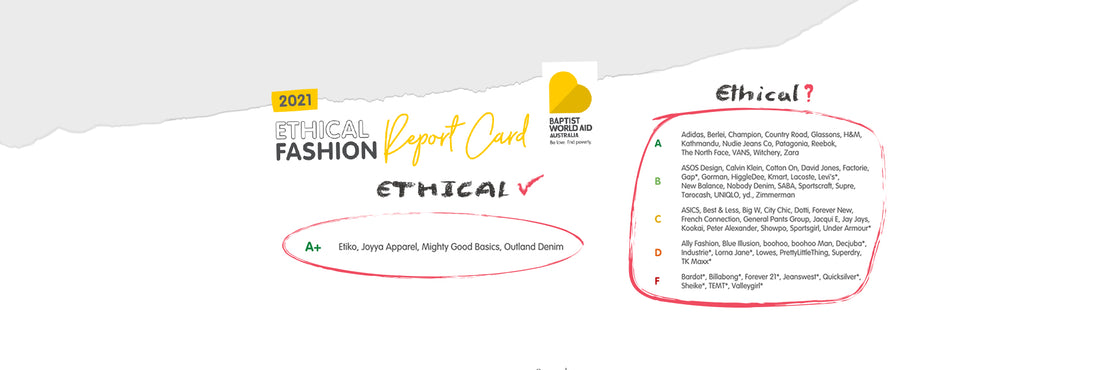Etiko is the proud recipient of another A+ rating in the Baptist World Aid Ethical Fashion Report. It's our eighth consecutive top score - we've received top grades every year the report has been published. But this year, the report results are a little more transparent and have confirmed concerns we’ve had for many years.
While the Ethical Fashion Report can be an amazing tool to help businesses improve, and we believe it's created with the best of intentions, the grading system can be misleading to consumers.
In fact, we believe the report is damaging to those working within the fashion industry's supply chains because the report is inadvertently blocking the improvement of their human rights. Non-ethical brands who secure high grades are using these results to their financial advantage without having to change their procurement policies.
It's also disrespectful to the four A+ brands who work tirelessly to ensure their fashion labels are genuinely ethical and environmentally respectful.
Every year the report has been published, we've tried to get the message out that the difference between an A+ and an A is huge. You can still read our blog about our 2019 ethical fashion A+. But this is the first time the difference has become obvious to more brands and consumers. That's because it's the first year the score guide for each grade has been released.
Buried on page 12 of the 13-page ethical fashion guide, you'll find the grading system shown in our header. It explains that a company getting a score of 50 out of 100 will receive an A grade. I'm an ex-high school teacher, and my students would have received anything but an A for a 50/100 score. And I believe most consumers would also expect an A grade brand to have done better than barely pass the halfway mark.
It's this grading system that led Outland Denim's founding CEO, James Bartle, to publicly state, "I believe this report is potentially one of the greatest setbacks to the ethical and environmental sustainability movements I've witnessed in the past 10 years." And we agree.
Well-intended consumers will use the ethical fashion report to guide their purchasing choices as they approach Christmas and their everyday shopping requirements. Because the rating system is misleading, these consumers will, in the worst case, be inadvertently supporting sweatshop, slave and child labour. In the best case, they will be supporting a brand attempting to improve but who still hasn't cut the grade on ethics. Consumers deserve better. Ethical brands deserve better. Garment makers and cotton farmers deserve better.
The Baptist World Aid ethical fashion report could be a wonderful thing, and it generates vital conversations about the ethics within the fashion industry and the urgent need for improvement. But the communication method of this report must change to ensure consumers can shop their values and big brands stop profiting from exploitation.
We also believe it shouldn’t come down to a not-for-profit to spend their valuable resources on scrutinising and grading the fashion industry. Where is the Australian government or the United Nations on this? Why aren’t they doing more to ensure that our economy and the fashion industry is not run on the back of slave, sweatshop or child labour? It’s time to do better.


3 comments
Totally agree with you. I don’t think any of the companies getting an A deserve one. It gives a totally false picture of the industry.
Congratulations on your A+ score and your explanations of the difference between A+ and A. If an A rating can be gained from a pass of 50/100 what are the other rankings and how low do they go?
I totally agree. I don’t for one minute believe kmart, cotton on or several others on that list should be anything other than F. It is giving a false sense of doing the right thing to mindless fashionistas on the gram showing off their latest hauls. Anyone who thinks a pair of $20 kmart jeans is made with the same ethical standards as outland denim needs a brain transplant
Leave a comment